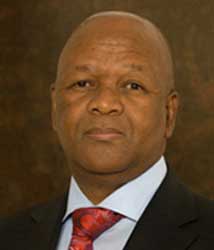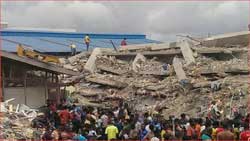
On 12 September, 84 South Africans died when a building at the Synagogue Church of all Nations in Nigeria collapsed. Last week, 25 injured South Africans returned home, while one remained in Lagos.
Radebe said of the patients admitted to the Steve Biko Academic Hospital, two are still in critical care, two have been transferred to private facilities at the request of their families and four patients have been discharged.
"On behalf of government and the people of South Africa, we wish the patients who remain in the care of the medical staff at the Steve Biko Academic Hospital a speedy recovery," Radebe said.
Radebe, who is the head of the Inter-Ministerial Task Team on the Nigeria tragedy, updated media on the identification process being used in Lagos.
"We want to assure the nation that we will ensure that the deceased are repatriated. We believe the repatriation of the deceased is the crucial in helping the families find closure in the aftermath of this terrible tragedy.
"We will make sure that all deceased persons are repatriated and that the correct body is handed over to the family. It is important to note that specialised scientific processes will be used to identify the remains," Radebe said.
He said the South African team of experts on the ground in Nigeria is working closely with officials from the Nigerian Federal Government as well as the State of Lagos.
The South African team is led by Brigadier Leone Ras, an international expert in body identification from the South African Police Service. She is supported by Professor Gert Saaiman, Chief State Pathologist from South Africa.

Radebe said the identification process is done through:
"As we strive to ensure that the body identification is completed as soon as possible, we have to make sure that the processes are done in line with Lagos State and Nigerian Federal laws," Radebe said.
Radebe appealed to the families to bear with them and allow their team in Nigeria the necessary time to complete the process of identifying the bodies.
"It is clear from this information that we are adopting a methodical and time consuming identification process. While we may not be able to predict the exact timeframes for completion, all possible efforts are being made to do so as quickly as possible," he said.
He said as soon as the bodies are identified, a team of 70 experts from the South African Military Health Service and the Department of Health will depart for Lagos to bring the bodies home to South Africa.
Radebe thanked the South African National Defence Force for the successful evacuation of the injured South African citizens from Lagos. "They have indeed made all of us very proud as a nation," he added.
A national task team comprising Social Development, SAPS Chaplain Services and the Victim Identification Centre have been visiting families of people presumed to have died at the church. Other teams of social workers are providing psycho-social support to survivors and families of victims at the Steve Biko Hospital, OR Tambo International Airport and the DIRCO call centre.
SAnews.gov.za is a South African government news service, published by the Government Communication and Information System (GCIS). SAnews.gov.za (formerly BuaNews) was established to provide quick and easy access to articles and feature stories aimed at keeping the public informed about the implementation of government mandates.
Go to: http://www.sanews.gov.za